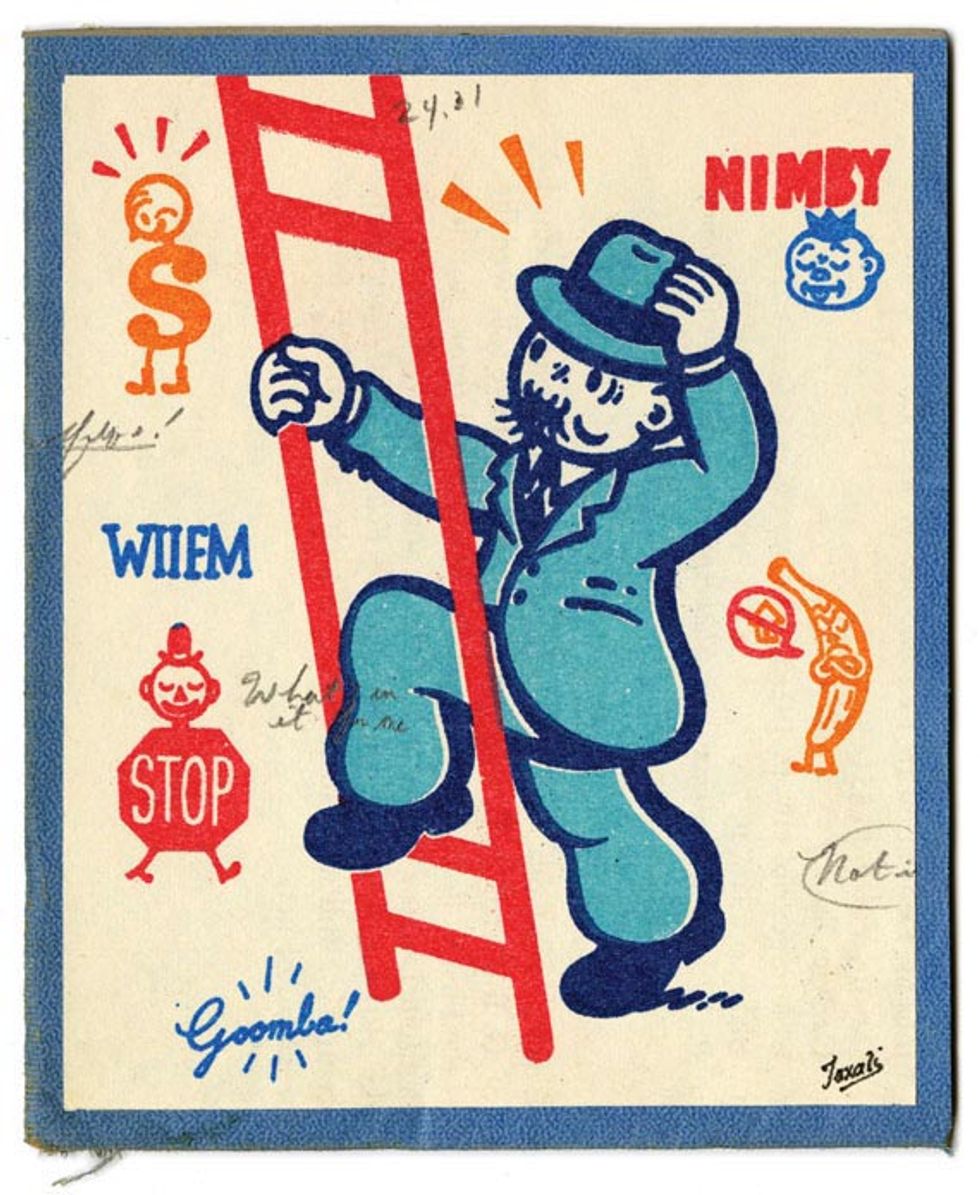The proposed project was a big one for San Francisco to be sure—one that promised to increase commerce and tourism dramatically. And there were many a righteous citizen dead set against it. Building the project, one Katharine Fullerton Gerould declared in Harper’s Magazine, was the kind of gesture that should be reserved for those business-obsessed Los Angelenos. Any true San Franciscan concerned with the city’s “uniqueness,” she crowed, should be opposed. The year was 1924, and the project—you are probably way ahead of me here—was the Golden Gate Bridge.
Anyone who has ever attempted to do business in San Francisco has likely had a run-in with the Geroulds among us. They comprise neighborhood committees, environmental groups, and historical societies. They are the activists who represent every possible sub- and micro-culture in San Francisco, from the homeless and the disabled to the chemically sensitive and the dog owner. (Yes, there is now a political action committee for dog owners called, of course, DogPAC.) Through the decades, these advocacy groups have pushed thousands of laws to ensnare business people, turning the city into an unholy patchwork of overlapping zoning laws and regulations that, while often put in place with good intentions, have a cumulative effect. In a city that prides itself on being liberal when it comes to everything from sexuality to free speech, we have nothing that resembles free enterprise. We are a city that allows—even encourages—everyone and anyone to make your business their business.
Think you can just file all the correct paperwork and fly under the radar? Think again. The moment you apply for a conditional use permit to do anything with your property, the city’s planning department will send out a notice to every community activist, neighborhood association, business, and special interest group they know of in your zip code. The master mailing list runs to more than 450 individuals and organizations.
Amongst business owners, tales of City Hall red tape and crazy residents who use the system to delay or oppose a project are traded like war stories and then spread with the speed of urban legends. Remember a couple springs past when Mission kook “Chicken” John Rinaldi decided to battle the commercialization of Dolores Park? Rinaldi threatened to organize a protest of people to collectively spit on the food kiosks in the park. Garnering loads of local press, he essentially won. Blue Bottle, which had worked with the city for more than a year to put a coffee truck in the park, pulled out. “Basically, we got sick of talking about Dolores Park every day,” James Freeman, owner of Blue Bottle, told a Mission Local reporter. “It demanded more attention than it really deserved.” A couple years ago in the Castro, neighbors successfully shut down an Ike’s Sandwich shop (which finally reopened in another location this year) because, well, too many people wanted their delicious sandwiches. People in line were too noisy! The smell of bacon was too strong! “What he does,” one neighbor said of the sandwich shop owner, “is terrorize the neighborhood.” With what, a baguette?
Today, there are citizens on Potrero Hill fighting a zoning change that would allow for the opening of, wait for it, a daycare center. Neighbors in the Mission are up in arms about the conversion of a long-abandoned liquor shop into a small restaurant. And god help you if you want to open a chain store in the city—just ask the people who proposed opening a PetCo in the Richmond or an American Apparel on Valencia Street. My favorite recent example comes from the Mission, where Peter Acworth, who runs the porn business Kink.com out of the old Armory, is opposing the nearby construction of an eight-unit apartment building. You’d think that a guy who runs a 200,000-square-foot hardcore BDSM empire and a website offering everything “from sex machines to rope bondage to erotic wrestling” would be a little more, I don’t know, laissez-faire.
Sadly, it is often the small and creative businesses without deep pockets that have the roughest go of it. Many eventually go into debt while navigating all the red tape. Teresa Nittolo and her partner Gavin Jefferies had high hopes in 2007 when they bought at auction a long-unused firehouse on Pacific Avenue in Russian Hill. The price tag for Firehouse 8 was north of $1.5 million. Nittolo, who had run boutiques Belle Cose and Molte Cose on Polk Street for more than two decades, and Jefferies dreamed of fixing up the firehouse to create a space for local artisans and artists to display and sell their works. On the second floor, filmmakers could hold screenings, and writers could read from their latest books. They also hoped to open a cafe. It would be a place for the young and old of the neighborhood to gather, collaborate, and be creative together.
The idea originally was just to fix the place up—make it safe and clean—and open for business. But building codes required so much more than that. There were seismic upgrades and a mandatory elevator to the second floor, which would need special electrical hookups from PG&E initially estimated to cost between $20,000 and $50,000. At the end of the day, the bill to hook up electricity was $110,000. The changes required by the building department also demanded approvals from the Historical Commission. That necessitated hiring an architect to gin up an expensive brochure with illustrations of what the place would look like. Meanwhile, fees to the building department kept piling up, eventually topping $30,000. And one city worker even billed the couple an extra $3,000 for working overtime on their plans. “I never did understand that one,” says Nittolo who, like many business owners, was unpleasantly surprised by the department’s steep hourly fees to approve and critique their plans. For some projects, these fees can run into the hundreds of thousands of dollars.
“There was bill after bill from the city and permit after permit,” says Jefferies. “Everything seemed designed to slow the project down. You’d have to have a team of experts to get one of these projects through. And you’d have to be able to pay them of course.”
Had the property value kept pace with the mortgage interest rate, it would have made a big difference. But the economy headed south, and with every month of delays, the mortgage came due. Eventually the property tax bills went unpaid. This month, Nittolo and Jefferies’ dream ends in a foreclosure sale unless they can find another $100,000 to keep the project alive. Even then, they figure it would take another half million to see it through to completion.
It is rarely just one onerous building code, or the unexpected fees, or an objection from a neighbor that brings a project to a halt. Rather it is the accumulation of all these hassles. It wears at the soul. There are powerful people in this town—politicians, lawyers, and citizens—who have made their names and sometimes fortunes by getting in other people’s way. Some lawyers specialize in stopping or slowing down businesses, and politicians gain prominence and votes for their willingness to say no. Those who try to take even the most ridiculous regulation off the books often find resistance. “There are politicians and others who don’t want to see this byzantine system of rules and regulations changed because they like to be the only ones who know how to navigate it,” says District 8 supervisor Scott Weiner. Weiner is pushing legislation to simplify the complicated ways the city classifies restaurants and cafes.
Frank Noto, president of GCA Strategies, has built a business shepherding business owners through the barriers set up against them. Having worked with both large retailers and smaller clients, Noto has formed a rather astute psychological profile of NIMBYs (an acronym for Not in My Backyarders)—whether they be neighbors, city commissioners, or local politicians. The furors NIMBYs direct at a given project, he believes, may reflect the challengers’ feelings of powerlessness in other arenas of public life. Perhaps they are angry about the Iraq War or Citizens United. That inchoate frustration at the larger world can find a lightening rod when a new business tries to open in the neighborhood.
Noto recommends that business owners try to placate the emotional needs of NIMBYs. “It’s not enough to send them a project description in the mail. That would only insult them,” Noto says. “They feel that their special status should be recognized by personal interaction. This is how they validate their status as community leaders. They expect to be consulted.”
Of course, those who make it their business to oppose yours might be willing to see your side of things for a price. Those “terrorized” neighbors of Ike’s Sandwich Shop offered to tolerate the business in exchange for $800,000. For upward of thousands of dollars, many restaurants are recommended to hire expeditors—people with an in to the city’s slow-going building department—to speed up the process of receiving a building permit.
With so many difficulties in starting and running a business here, San Francisco is once again a red-meat talking point for the political right. After a recent piece in The New York Times on the travails of opening a Cole Valley ice cream shop, the conservative blogosphere salivated. “The desire to micromanage is inherent in the liberal mind,” wrote the Daley Gator in response. “If you want economic growth, do not kick businesses in the groin with regs and taxes. Will the left ever learn this rule?”
“It makes absolutely no sense to put a stranglehold [on businesses] in this manner,” wrote another blogger on Outside the Beltway. “The failure rate for a small business is already high—even in a good economy.”
And they may have a point. NIMBY no longer cuts it for describing the opposition facing local entrepreneurs. The situation is in overdrive. San Francisco is now home to CAVEmen (Citizens Against Virtually Everything), GOOBA (Get Out of My Business Area), NIMEY (Not In My Election Year), WIIFM (What’s In It For Me) and NIMFOS (Not In My Field of Sight). At the top of this mutating food chain is BANANA (Build Absolutely Nothing Anywhere Near Anything).
Progress to fix the problems at City Hall is slow and sometimes comical. A couple years ago, when supervisor David Chiu introduced legislation to nix some extraneous business fees, the board patted itself on the back for cutting red tape. Special fees would no longer be collected from those organizing funeral processions, rodeos, and wrestling exhibitions (among other quixotic activities)—fees that no one was really paying in the first place.
In January of this year, Mayor Ed Lee gave us a glimmer of hope with the announcement of a $1.5 million revolving loan fund for small businesses, particularly in low-income neighborhoods. By the end of 2012, Lee also plans to launch Business One-Stop, an online service for small business owners to find answers to FAQs and requisite forms and permits.
The San Francisco Office of Small Business, opened by Gavin Newsom four years ago, is another bright spot. Among those singing its praises is Mission entrepreneur David Pierce, who has opened a handful of businesses in town, among them Schmidt’s, the Folsom Street German restaurant that opened a few years back after a harrowing ordeal. Not only did Pierce and his partner, Christiane Schmidt, struggle with an angry upstairs neighbor (look up from their restaurant and you’ll still see the evidence), they accrued debt in the process of plodding through the city’s permitting process. Within days of opening, a building inspector arrived for what they thought was a final signoff. But out came his red pen. It looked like they wouldn’t be opening anytime soon.
In a panic, Pierce and Schmidt called the mayor’s office and got hooked up with Martha Yanez, one of only four staff members at the Office of Small Business, which functions as a conduit for information. While the center prefers to consult with would-be business owners in the planning phase to explain the hurdles, it is available in crisis as well. Yanez took the Schmidt’s case to building department higher-ups and miraculously, Schmidt’s received its certificate of occupancy the same day. Needless to say, Pierce sent Yanez a bouquet of flowers.





















